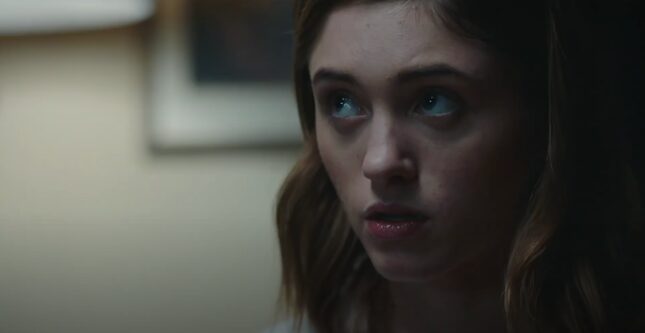Yes, God, Yes Director Karen Maine On Repressed Female Pleasure
Entertainment
Screenshot: Vertical Entertainment
Director Karen Maine says she “doesn’t really” read reviews, but two about her debut feature Yes, God, Yes have caught her eye. The first, by Catholic News Service, rates the film as “O”—as in, morally offensive. This rejection only proves the message Maine was trying to get at with her film about a sexually repressed Catholic teen: by teaching young women to quash sexual urges at all costs, Catholicism never allows them to properly explore bodily pleasure.
Maine prefers the slightly more progressive coverage she found in America Magazine, a Jesuit publication: “For those of us working in youth ministry, ‘Yes, God, Yes’ could serve as a cautionary tale,” it reads.
Yes, God, Yes is a horny coming-of-age film about a Catholic teen trying to avoid the sins of masturbation and sex. Alice (Natalia Dyer) is much too fond of the Titanic sex scene to stop touching herself. Her teacher (a priest) warns of sexual sin: sex before marriage is wrong, masturbation worse. Alice enters dangerous territory after she encounters an erotic AOL chat. Purity is harder than it looks.
The film is semi-autobiographical; Maine also went to a Catholic high school in Iowa and was taught many of the same lessons as Alice. They share a passion for Titanic, which Maine used to watch on repeat when she was home alone. “At one point there wasn’t even a remote,” she says. “I had to actually get up to go to the VCR to rewind the tape.” Specifically, Maine liked that sex scene—the part where Kate Winslet slaps her hand against a steamy car window. But as a teen with devout Catholic parents, friends, and teachers, she had nowhere to discuss these urges.
Now, thanks to her therapeutic Yes, God, Yes, currently available via video on demand, she can “just say the word ‘masturbate’ to my parents and not really bat an eye. I would say that’s a mark toward the right direction.” Last week, I spoke with Maine about Catholic guilt, sex ed, and being inspired by Titanic. This interview has been edited and condensed for clarity.

JEZEBEL: What was your idea of young female sexuality when you were going into writing Yes, God, Yes? Did that change at all during the making of the film or after it was released?
KAREN MAINE: I really wanted to make something that shows a female sexual coming-of-age story that was focused on self-pleasure, as opposed to losing your virginity or partners in sex. Oftentimes, women experience this first, in terms of discovering sex. But I think we’re inclined, as curious people, to explore our own body first. It’s not really focused on. It was so taboo for so long—I still think it’s really taboo. We do have more representation of female coming-of-age-centered stories, which is great. I’m thinking of Booksmart or Lady Bird—they do make mention of masturbation, but it’s such a small thing. When you’re a teen and you discover it, you really go down this rabbit hole of being obsessed with it and wanting to do it all the time. Exploring it. Ways to do it. All that sort of stuff. Hopefully, my film plays a small role in progressing it even further.
Do you think that this film should be shown in sex ed classes?
Oh my god. I would love that. When you’re talking about sex ed, a lot of times it’s just being safe and procreation and biology and reproduction. Because you don’t need female sexual pleasure to procreate, it’s often not mentioned. That’s built the stigma around it even more. If not showing this movie, at least discussing it and talking about how women can feel pleasure. And how their bodies work. For both themselves and for partners.
THERE’S A LOT OF FILMS THAT SHOW MALE MASTURBATION. BUT I WANTED TO SHOW THE FEMALE PART OF IT.
You mentioned similar female coming-of-age films. How do you think this film compares to films about the hypocrisy of Catholicism and Catholic teaching, like Spotlight?
Spotlight’s obviously a much more delicate, horrible subject matter. That’s an act of the Catholic church that’s just completely indefensible. But for Yes, God, Yes, I wanted to focus more on just women’s sexuality—how even that is considered off-limits in Catholicism. How damaging that can be to someone’s psyche and general disposition. I wanted to show the adult characters struggling with this. The general messages of Christianity get sometimes lost in Catholicism. I definitely didn’t want it to touch on a subject that was so extreme as what Spotlight does. It’s a light coming-of-age film—it’s not an intense drama.
Could you say more about the nasty Instagram messages about the trailer you received—did any of them remind you of characters from the film?
Honestly, the good comments I get outweigh the negative. I got a message today from someone who was like, “I don’t even want to write you publicly on Twitter.” So they sent me a private message just saying, “Thank you. I went through XYZ and I felt seen in your film.” Catholic repression really sticks with you. The comments I was getting that were negative—those people are worse than the people in my film. In film, it often comes across as too crazy to be realistic. But people like that definitely exist.
One of the recurring themes in the film and the short was the Titanic sex scene. Did that come from personal experience? Did you watch Titanic, or was it a different movie for you?
It was Titanic. There were other films, but Titanic was the one I watched alone. I remember my mom had gotten it for her birthday or something. It was two VHS tapes. I’m pretty sure at one point there wasn’t even a remote. I had to actually get up to go to the VCR to rewind the tape. But yeah, I really liked the car scene specifically. I think that so often, people like the nude drawing scene. But in the car scene, they’re having sex. An interesting point about female sexuality is sometimes it’s more [about] the intimate act of kissing. I think at one moment, she says, “Put your hands on me.” He touches her breasts—and it’s covered; it’s on top of her clothes. But it’s really, really sexy. I didn’t really like the drawing scene. I think female sexuality is a lot more fluid, in terms of what’s a turnon.
Both Yes, God, Yes, and Obvious Child, which you wrote, take on controversial yet important topics in women’s sexuality. Are there other specific topics you’re interested in?
With Obvious Child, we saw a lot of films where women would get unexpectedly pregnant and have an abortion, seemingly just to carry a narrative of developing a romance with whoever got her pregnant. That just wasn’t what me and my friends who wrote that were seeing in our lives and in our friends’ lives.
And then the same sort of thing with Yes, God, Yes. There’s a lot of really great coming-of-age films, but they often show painful sex. I wanted to see women exploring their own bodies more. American Pie, The Squid and the Whale—there’s a lot of films that show male masturbation. But I wanted to show the female part of it. I definitely want to find other ways to show women portraying new roles in cinema that feel very familiar to the women we are and that we know—but we’re either afraid to talk about, or men have been afraid to show on screen.
Fletcher Peters is a writer based in New York. She unapologetically loves rom-coms and aspires to be Nora Ephron.